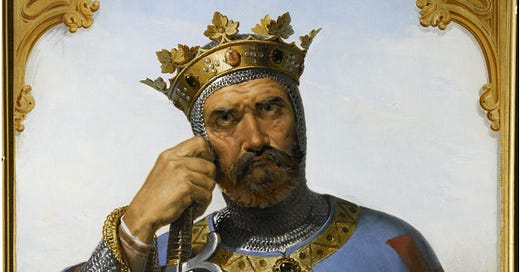Bohemond of Taranto: Crusader & Conqueror
Historian Georgios Theotokis recounts the great Norman commander Bohemond's remarkable rise to power.
Bohemond of Taranto was a man of boundless ambition and inexhaustible energy. He was, in the words of Romuald of Salerno, ‘always seeking the impossible’. He proved to be one of the most remarkable warriors in medieval Mediterranean history, coming from a family of ‘soldiers of fortune’, the Hautevilles, who managed to establish a powerful principality in Italy and seriously threaten the Byzantine Empire’s very existence. Sadly, there is no portrait of this ‘giant’ of Medieval Mediterranean history. Yet, we are lucky to have a single lengthy and intimate portrait of his physical characteristics that is worth quoting here:
‘He was so tall in stature that he overtopped the tallest by nearly one cubit, narrow in the waist and loins, with broad shoulders and a deep chest and powerful arms. And in the whole build of the body he was neither too slender nor over weighted with flesh, but perfectly proportioned and, one might say, built in conformity with the canon of Polycleitus … His wit was manifold and crafty and able to find a way of escape [lit. ‘handle’] in every emergency. In conversation, he was well informed, and the answers he gave were irrefutable. This man who was of such a size and such a character was inferior to the Emperor alone in fortune and eloquence and in other gifts of nature’.
This detailed description of Bohemond was penned by Anna, the daughter of the Emperor Alexios I Komnenos, in her brilliant mid-12th century account of the life and achievements of her father that also bore his name, the Alexiad. She portrayed the Norman as her father’s nemesis around the end of her work in Book 13, yet it is not until Bohemond became a crusader in the summer of 1096 that he drew Anna’s virulent attacks. After that, no colours are too dark for painting him. Bohemond is deliberately framed by Anna as the anti-hero to the brilliant Alexios, with the Norman warrior even surpassing his father Robert Guiscard in greed, treachery and dishonesty, becoming the ‘fons et origo malorum’ of the western knights, and ‘a living model of his father’s character in audacity, bodily strength, bravery and untameable temper.’
Keep reading with a 7-day free trial
Subscribe to Aspects’s Substack to keep reading this post and get 7 days of free access to the full post archives.




